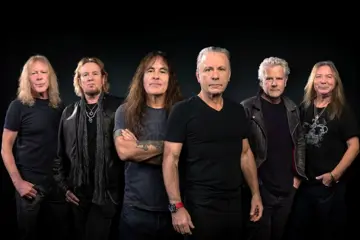Since 2023, Spotify Australia have been following in the footsteps of their global parent and publishing their annual Loud & Clear report, outlining the details surrounding royalty payments in Australia and breaking down the global streaming economy.
As always, it's a fascinating insight into the nuts and bolts of it all, looking at the minutiae and statistics that make up the successes of homegrown musicians on both the local and international stage. Of course, this year's report is no different, and once again, it's a win for the Australian industry when it comes to its performance.
Up the top of the report is the news that Australian artists generated over $300 million in royalties in 2024 – a 14% increase from the year prior, and almost three times higher than those generated in 2017.
Needless to say, it's good news for Aussie artists, with independent artists and labels seeing the lion's share of royalties, and local music becoming more and more popular on the world stage. As Ben Watts, Spotify's Head Of Music for Australia and New Zealand explains, things are looking good for the country's music scene.
Don't miss a beat with our FREE daily newsletter
"It's just in a really strong position," he notes. "More and more Australians – and people internationally – are paying for streaming, and we are seeing those revenues come back to artists.
"I just feel so positive about everything related to the local industry based on this really clear and transparent data that we've got."
Watts has been in the music industry for close to three decades now, having worked across the world of music and TV, ranging from time spent in journalism, to roles with the ABC, Apple, and – for close to five years now – with Spotify, ranging from being their Head Of Podcasts, Head Of Content, and now Head Of Music.
Needless to say, with so much time spent in the world of music, he's been witness to the ups and downs of the local industry. But with the past year seeing a 14% growth in royalties for local artists, he explains that it shows Australia holds a strong place within the global music scene.
"There is more competition than there's ever been in streaming, there's more music being uploaded locally and internationally, but there's so much more opportunity for Australian artists," he explains.
"This idea in the past that there was a clear narrative for Australian artists succeeding locally and then expanding globally, I think what we see now is so many different paths that artists take to succeed and they define success in so many different ways."
Pointing towards the likes of Richard Kingsmill's recent podcast on You Am I, Watts explains how bands of their calibre found themselves hamstrung by a system in which they were recognised by their home country and their international peers, but their success was predicated on the antiquated concept of needing deals in different places for their music to be heard.
"It suddenly made me realise that the problem doesn't exist anymore because of streaming," he explains. "Anywhere that an artist is touring around the world, essentially, their music can be heard. We forget how hard it used to be in the past, it's something we take for granted.
"You see the success of a band like Amyl And The Sniffers who are this incredible live band who have just built up at every step just got better and better and toured their arses off internationally. But while they've done that, they've had the ability for anyone who just gets so excited by their music to be able to pick up their phone and stream them right away.
"So I think that's something that I've found really practically that difference of where streaming is having an impact," he adds.
In fact, the discovery of artists like Amyl And The Sniffers is widely seen on the likes of Spotify, with the Loud & Clear report also noting that Aussie acts were discovered by first-time listeners more than 2.8 billion times – a 100 million increase on last year's stats.
"That potential, that Spotify as a leader in that space, is creating for Australian artists is just exponential," Watts notes.
Of course, this upward trend that we've been witnessing is indeed wonderful, but logic dictates that all good things must come to an end since continual growth can't continue indefinitely. Watts refutes this, however, largely thanks to the ingenuity and enterprising nature of the artists who use the streamer.
"I use Amyl And The Sniffers as an example, but then you look at an artist like Melbourne hip-hop artist Lithe, who has more organically blown up in streaming and in socials to be a global artist," he explains.
"There are perceptions of someone like Lithe as being an overnight success, but the reality is he'd released a lot of music and was working really hard before he had that breakout last year."
Another example is the likes of Ocean Alley, whose 2018 track Confidence peaked at #9 on the ARIA Charts after winning triple j's Hottest 100 countdown. Historically, this may have been the theoretical peak for a track, with its fame only receiving diminishing returns from that point on.
In 2023, however, the track received a resurgence thanks to TikTok, once again entering the local charts, and managed to find itself on the top spot for Spotify's Viral 50 in the US, and in the top ten for its Global counterpart.
"It's a credit to the band that they then capitalised on that opportunity and went touring and have built on that," Watts notes. "I think there's just so many more opportunities for the way artists can develop their careers over time, and I don't see that changing; I can only see it getting stronger."
Another important factor in the growth of Aussie music is the growth of the indies. According to the Loud & Clear report, more than half of all royalties generated by Australian artists were by either independent artists or labels. That's also consistent with the global figures as well, and indicates a positive trend when it comes to acts using that aforementioned sense of ingenuity in terms of their own journeys.
"Independent artists are a broad range of people, but when I think of that figure, I think of artists who are defining their own career on their own terms, using our tools and using our data to help inform that, but really driving their own path," Watts says.
"Sons Of The East are another example of that in the folk world, but that's what I think of when I think about growth in independent music."
Of course, though indies comprise the majority of the royalties paid by Spotify, Watts says he doesn't see an exodus from the industry when it comes to the majors.
"I think you're going to see some artists who are going to want to do their own thing and maybe go with indies, and some artists that want to stay with the majors and utilise the support that's there," he notes. "I think we're going to see all aspects of the industry flourish in the way that we have in the past.
"I think that that's good for the whole industry. We are seeing every element of the industry experiencing growth – the majors as well as indies – which is great."
The love of Australian music also comes from outside of the borders as well. In fact, the Loud & Clear report also notes how in addition to a total of 57.1 billion plays of local acts in 2024, more than 80% of all royalties generated by Australian artists on Spotify in that year were from listeners outside of Australia – ultimately putting Australia in the top 10 exporters of music worldwide.
"I think what it shows is that the majority of Australian artists have that international ambition," Watts says. "They're thinking global in a globalised streaming music economy, and I think that's great.
"There's levels of different opportunities, there are different artists doing very different things in the way that they're growing their audience, and our role in that is to really help them. We provide a lot of editorial support, and we use our global network to champion Australian music.
"Our team here are so passionate about giving them that editorial support globally where they can be discovered by other editors and end up on different playlists, but also providing them the tools that we have that they give to us so that they can utilise them the best as possible and drive their own career."
Indeed, our local acts have been showing up on a dizzying amount of playlists this year, more than 1.6 billion, in fact – with more than 99 million being made by Australian users, proving just how popular that music is with international crowds. But what is it about local music that is so enticing to those beyond our borders?
"I'm probably biased in how I think Australian music is incredible, and I think maybe it's the underdog aspect, though it's a bit of a cliché to say that," Watts muses. "But coming from elsewhere can sometimes drive that passion to succeed and to prove ourselves. But I also think we're seeing Australian artists purely take off because an individual song is incredible.
"There's a thousand reasons, and I don't know the special sauce, but we're trying to export that special sauce as much as we can."
That special sauce has been found and devoured by myriad listeners around the globe, with so many drawn to the music that local artists are creating. Furthermore, the influence of these artists are also being felt in some areas more than others, with Watts pointing to the huge artists that have been dominating the dance and electronic music scene in recent years.
"We've got these tiers of artists coming through," he notes. "You've got Flume and Alison Wonderland, these artists who have had these incredible careers for 10, 15 years and have been at the top of their game for that period, and now you've got FISHER and Dom Dolla, and just the sizes of their audiences globally, that's always mind-boggling.
"Then you just see this next tier of an even bigger range of artists coming through, like Odd Mob and Tobiahs. It's this thing where Australian artists are seeing others succeed, and that's creating this ecosystem that is just seeing Australian music just grow and grow."
Notably, Spotify's constant growth and continually trending royalty payouts have undoubtedly shown a strong projection for the Australian music sector – some much needed good news, especially given the recent stories about Australia falling out of the top ten global music markets for the first time in three decades.
However, as Watts states, the figures outlined in the Loud & Clear report indicate a solid future for local music – a future which leaves him feeling optimistic about our position in the global market.
"I think our position is looking great," he notes. "I do acknowledge that stat [about Australia falling out of the global markets], and I think we are seeing the growth in Australian music globally. We're also seeing other markets grow – markets, frankly, with much bigger populations than we have.
"And that's going to happen. But I think what we are focused on is just seeing Australian artists do better and better and continue to succeed globally. I think the positivity we have that this double-digit growth will continue is very strong."
With these trends on hand, it does also provide the chance to look into the crystal ball a little bit and wonder about what the future may hold. Of course, it's impossible to make concrete predictions about the future, and instead, only make educated guesses based on what the data shows, but as Watts says, there's an overwhelming sense of optimism tied to the latest Loud & Clear report.
"I already think that Australian music is top tier, and I think that we're already showing how well artists are doing locally and globally," he explains. "So I can only see that it continues into the next five years.
"What I will say is that in the last few years we've seen the way that Australian artists are breaking and finding success, I think we are going to see that infinitely increase as well. We are going to see different ways that I would never have imagined when it comes to artists finding success. And that's great because they should be driving their own success.
"We can support them as much as we can, and I think at Spotify we're doing a great job of supporting them, but those artists, it's always gonna be down to them having amazing music and them having the passion to drive their careers," he adds. "And we are just so excited to continue to support them with that."
Read Spotify's full Loud & Clear report here.
















